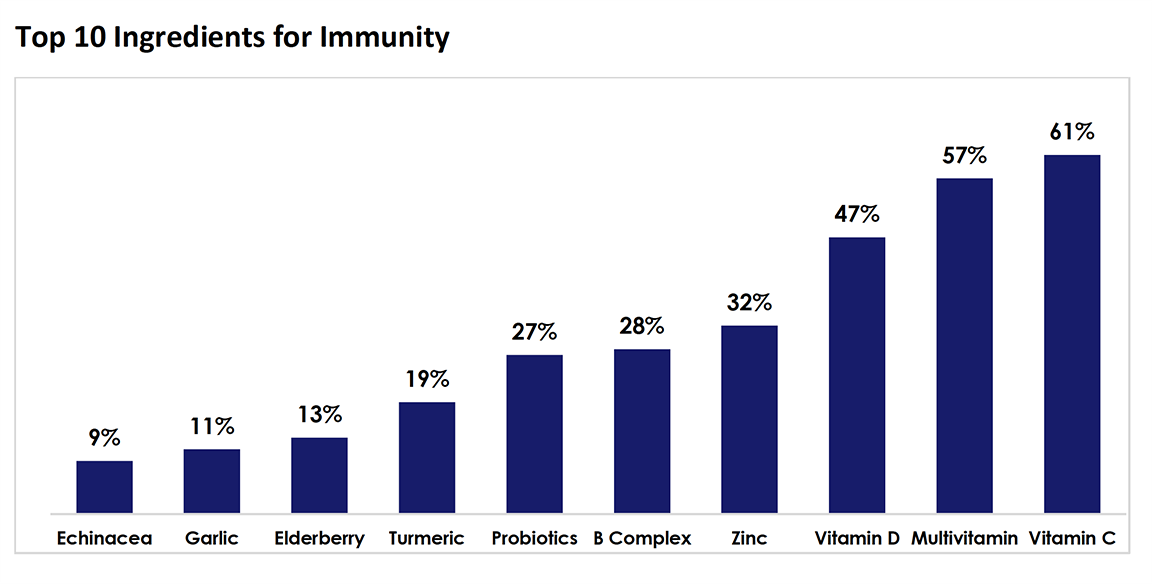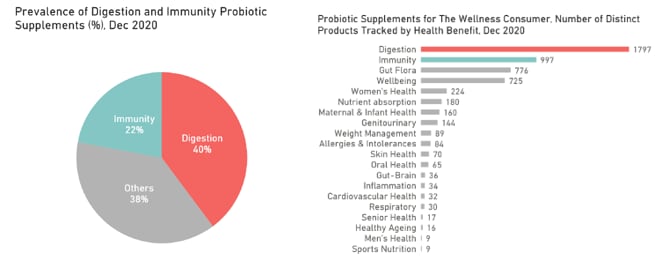Immunity, a current and future trendy market
Immunity has been a major consumer focus for years (about 8% of CAGR 2017-2019 in dietary supplements). Today, consumers consider it more important than ever. The demand has exploded worldwide in 2020, showing high to incredible growth rates (from 6% to 55%) depending on areas. In 2019, we observed a global market size for the immunity market valued at $830 billion. With the explosion of the demand and huge growth in 2020, the immunity market is expected to reach $1 trillion.
This amazing growth is seen, not only in all the different matrices that can be found in this immunity market such as dietary supplements, food, and beverages, but also all geographical areas. The ingredients are mostly focused in are vitamins, minerals, and probiotics
In the US, 35% of consumers are motivated to purchase a nutritional or meal-replacement drink or product that contains immune health supporting ingredients. In Canada, 38% of consumers are interested in vitamins, minerals, or supplements to improve the immune system.
In Europe, more than one in two consumers agree that they take vitamins, minerals, or supplements to strengthen their immune system.
The market in Asia-Pacific region is expected to grow significantly due to increasing consumer awareness of nutrition, health, and well-being. In Thailand, 47% of consumers find immunity-improving functional benefits appealing when choosing food and drink products

In the immune market, the top ingredients are represented by Vitamin C, Vitamin D, zinc, B complex vitamins, and probiotics. Multivitamins are not really considered as a proper ingredient for immunity because it is a mix of vitamins C, D, and B complex. We can see that the immunity market is driven by vitamins. The main mineral with a benefit on immunity is zinc. In the top five ingredients, we also find probiotics, knowing that the probiotics market is, like the immune market, an expanding market.
A booming probiotics market that is expected to continue to grow
In a world in constant evolution, the probiotic market has not been spared. Thanks to this evolution, we observe a global probiotic market valued at $140.3 billion in 20201. This growth will continue for the long-term and we expect a compound annual growth rate (CAGR) of 8.6%1 worldwide from 2021 to 2028. This boom may be explained by the increased incidence of infectious diseases worldwide. Today, more than ever, consumers want to take care of their health and are actively looking for solutions such as probiotics. According to the FAO WHO probiotics are a “live microorganisms which when administered in adequate amounts confer a health benefit on the host”. Consumers see probiotics as a good way to address their health concerns. Consumers are turning to these solutions in addition to a healthy lifestyle and a balanced diet to be sure that they are doing all they can to take care of their health.
The amazing growth of the probiotic market shows that consumers are looking for solutions which provide health benefits such as digestive health and immunity, the two main benefits supported by probiotics, with immunity in a second position shortly after digestion.

Probiotics may be the answer to the growing demand for products with a beneficial effect on immunity and become a real alternative to the mainstream ingredients vitamin C, vitamin D, B complex vitamins, and zinc.
Despite this rapid growth on the probiotic market, it can be challenging for industrials to incorporate traditional probiotics into formulas. The stability of traditional probiotics decreases over time as does their effectiveness. To limit the decreasing efficacy of traditional probiotics, the providers of probiotics have developed new solutions: stable probiotics.
BSCU1: a solution to support immune growth.
In this regard, Gnosis by Lesaffre offers one of the most stable probiotics which may support immunity: LifeinU™ BSCU1. This new solution is a fine powder of Bacillus subtilis, a common and safe bacterium. LifeinU™ BSCU1 is a specific strain of Bacillus subtilis of Gnosis by Lesaffre and is registered in the CNCM collection under the number I-2745 which is protected by a patent.
An efficacy supported by a clinical study
The efficacy of LifeinU™ BSCU1 is supported by a clinical study conducted for four months. During this study, one of the markers analyzed is the level of Secretory Immunoglobulins A (sIgA) which are antibodies of the immune system, secreted by the mucosal surfaces. They constitute the first line of body defenses against toxins and infectious agents. SIgA’s are key elements in the protection of respiratory and intestinal epithelium.
LifeinU™ BSCU1 may reduce the number of common infections, especially common colds. Most adults catch a cold up to four times a year, with children and seniors having them up to 10 times a year. A supplementation with LifeinU™ BSCU1 may empower consumers and may reduce the prevalence of common colds at all stages of life.
LifeinU™ BSCU1 supplementation is associated with a 31% reduction of the relative risk to report an infectious episode.
Increase the shelf life of products with LifeinU™ BSCU1
LifeinU™ BSCU1 is suitable for premium dietary supplements thanks to its extreme stability, superior compared to the one of other historical probiotics like lactic bacteria. LifeinU™ BSCU1 is stable through 24 months under many storage conditions (different ICH zones) and in its closed original packaging. Another strength of LifeinU™ BSCU1 is its ability to be combined with other ingredients that can be claimed to have a beneficial effect on immunity, such as selenium and zinc.
LifeinU™ BSCU1 can also be incorporated into several matrices. Due to its functional properties, LifeinU™ BSCU1 is stable through several industrial processes. Where high temperatures and humidity would kill probiotics, LifeinU™ BSCU1 perseveres. This stability allows LifeinU™ BSCU1 to be incorporated into functional foods and beverages matrices such as nutritional mixes, sport powders, and cereal bars.








